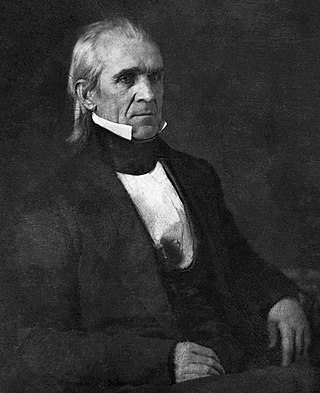
James Knox Polk was the 11th president of the United States, serving from 1845 to 1849. He also served as the 13th speaker of the House of Representatives from 1835 to 1839 and the ninth governor of Tennessee from 1839 to 1841. A protégé of Andrew Jackson, he was a member of the Democratic Party and an advocate of Jacksonian democracy. Polk is known for extending the territory of the United States through the Mexican–American War during his presidency, annexing the Republic of Texas, the Oregon Territory, and the Mexican Cession after winning the Mexican–American War.
The Whig Party was a conservative political party that existed in the United States during the mid-19th century. Alongside the slightly larger Democratic Party, it was one of the two major parties in the United States between the late 1830s and the early 1850s as part of the Second Party System. Four presidents were affiliated with the Whig Party for at least part of their terms. Other prominent members of the Whig Party include Henry Clay, Daniel Webster, Rufus Choate, William Seward, John J. Crittenden, and John Quincy Adams. The Whig base of support was centered among entrepreneurs, professionals, planters, social reformers, devout Protestants, and the emerging urban middle class. It had much less backing from poor farmers and unskilled workers.
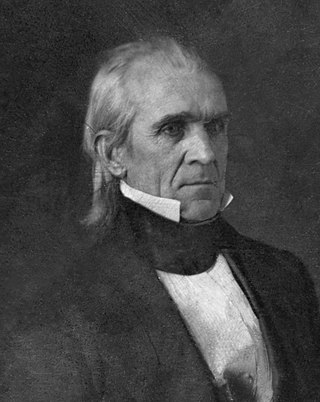
The 1844 United States presidential election was the 15th quadrennial presidential election, held from Friday, November 1 to Wednesday, December 4, 1844. Democrat James K. Polk narrowly defeated Whig Henry Clay in a close contest turning on the controversial issues of slavery and the annexation of the Republic of Texas. This is the only election in which both major party nominees served as Speaker of the House at one point, and the first in which neither candidate held elective office at the time.

The Compromise of 1850 was a package of five separate bills passed by the United States Congress in September 1850 that temporarily defused tensions between slave and free states in the years leading up to the American Civil War. Designed by Whig senator Henry Clay and Democratic senator Stephen A. Douglas, with the support of President Millard Fillmore, the compromise centered on how to handle slavery in recently acquired territories from the Mexican–American War (1846–48).
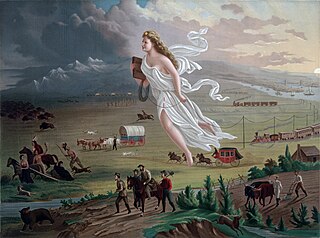
Manifest destiny was a phrase in the 19th-century United States that represented the belief that American settlers were destined to expand westward across North America, and that this belief was both obvious ("manifest") and certain ("destiny"). The belief was rooted in American exceptionalism and Romantic nationalism, implying the inevitable spread of the Republican form of governance. It was one of the earliest expressions of American imperialism in the United States of America.
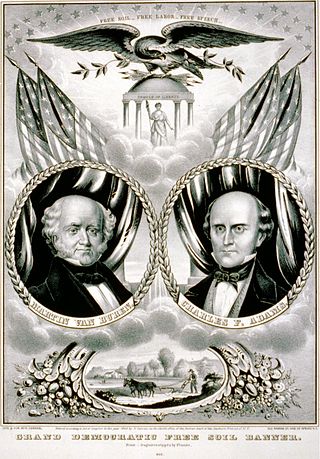
The Free Soil Party was a short-lived coalition political party in the United States active from 1848 to 1854, when it merged into the Republican Party. The party was largely focused on the single issue of opposing the expansion of slavery into the western territories of the United States.

The Republic of Texas was annexed into the United States and admitted to the Union as the 28th state on December 29, 1845.

Jacksonian democracy was a 19th-century political philosophy in the United States that expanded suffrage to most white men over the age of 21 and restructured a number of federal institutions. Originating with the seventh U.S. president, Andrew Jackson and his supporters, it became the nation's dominant political worldview for a generation. The term itself was in active use by the 1830s.
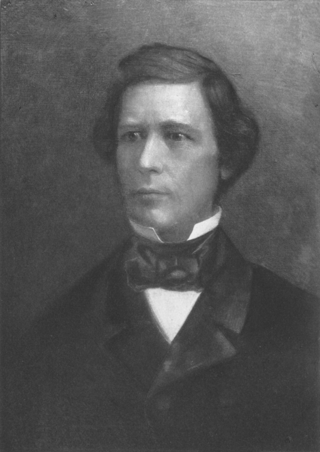
David Wilmot was an American politician and judge. He served as Representative and a Senator for Pennsylvania and as a judge of the Court of Claims. He is best known for being the prime sponsor and eponym of the Wilmot Proviso, a failed proposal to ban the expansion of slavery to western lands gained in the Mexican Cession. A notable member of the anti-slavery Free Soil Party, Wilmot later was instrumental in establishing the Republican Party in Pennsylvania.

Robert James Walker was an American lawyer, economist and politician. An active member of the Democratic Party, he served as a member of the U.S. Senate from Mississippi from 1835 until 1845, as Secretary of the Treasury from 1845 to 1849 during the administration of President James K. Polk, and briefly as Territorial Governor of Kansas in 1857. He was responsible for drafting the 1849 bill that eventually established the United States Department of the Interior.
The All of Mexico Movement, or All Mexico Movement, was a political movement to expand the United States to incorporate all of Mexico. It was a controversial aspect of Manifest Destiny that was unable to garner enough political support to encourage adoption. The Mexican-American War (1846-1848) brought the United States and Mexico into conflict over various geopolitical issues, including a desire to invade and annex much of Mexico, that resulted in victory for the United States.

The presidency of James K. Polk began on March 4, 1845, when James K. Polk was inaugurated as President of the United States, and ended on March 4, 1849. He was a Democrat, and assumed office after defeating Whig Henry Clay in the 1844 presidential election. Polk left office after one term, fulfilling a campaign pledge he made in 1844, and he was succeeded by Whig Zachary Taylor. A close ally of Andrew Jackson, Polk's presidency reflected his adherence to the ideals of Jacksonian democracy and manifest destiny.

The Mexican–American War, also known in the United States as the Mexican War, and in Mexico as the United States intervention in Mexico, was an invasion of Mexico by the United States Army from 1846 to 1848. It followed the 1845 American annexation of Texas, which Mexico still considered its territory because Mexico refused to recognize the Treaties of Velasco, signed by President Antonio López de Santa Anna after he was captured by the Texian Army during the 1836 Texas Revolution. The Republic of Texas was de facto an independent country, but most of its Anglo-American citizens who had moved from the United States to Texas after 1822 wanted to be annexed by the United States.

The 1844 Democratic National Convention was a presidential nominating convention held in Baltimore, Maryland from May 27 through 30. The convention nominated former Governor James K. Polk of Tennessee for president and former Senator George M. Dallas of Pennsylvania for vice president.
Joaquín María del Castillo y Lanzas was a Mexican politician who served twice as Secretary of Foreign Affairs and ten days as interim Secretary of Finance (1846) in the cabinet of Mariano Paredes.
Robert W. Merry is an American journalist, publishing executive and commentator.

Beverley Kennon was a career officer in the United States Navy who attained the rank of captain as head of the Bureau of Construction and Repair. He died as a result of the explosion aboard USS Princeton.

The history of U.S. foreign policy from 1829 to 1861 concerns the foreign policy of the United States during the presidential administrations of Andrew Jackson, Martin Van Buren, William Henry Harrison, John Tyler, James K. Polk, Zachary Taylor, Millard Fillmore, Franklin Pierce, and James Buchanan. During this era, the United States annexed the Republic of Texas, acquired the Mexican Cession by defeating Mexico in the Mexican–American War and partitioned Oregon Country with the United Kingdom of Great Britain and Ireland. The period began with the inauguration of Jackson in 1829, while the onset of the American Civil War in 1861 marked the start of the next period in U.S. foreign policy.

The California Statehood Act, officially An Act for the Admission of the State of California into the Union and also known as the California Admission Act, is the federal legislation that admitted California to the United States as the thirty-first state. Passed in 1850 by the 31st United States Congress, the law made California one of only a few states to become a state without first being an organized territory.
This is a bibliography of California history. It contains English language books and mainstream academic journal articles published after World War II.















